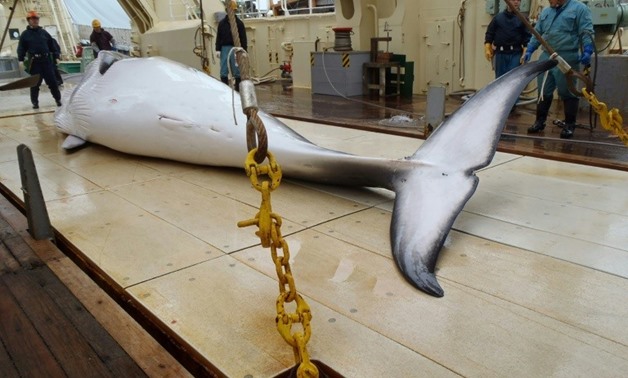
Japan hunts whales under a loophole in an international moratorium that allows for scientific research, but makes no secret of the fact that the animals' meat ends up on dinner tables - AFP/File / Institute of Cetacean Research
Sydney – 28 November 2017: Activist group Sea Shepherd on Tuesday released graphic video of Japanese fishermen harpooning whales in the Southern Ocean after a long battle with the Australian government to make the images public.
Filmed in 2008 by customs officials aboard an Australian patrol vessel, the images show Japanese boats in Antarctic waters harpooning the whales and then dragging their bodies out of bloodied waters.
Sea Shepherd initiated a freedom of information (FOI) request in 2012 to obtain the film from the Australian department of border protection, but was repeatedly refused with the government citing potential damage to "international relations".
The images were finally ordered released earlier this year after an appeal to Australia's Information Commissioner, who has power to review government agency FOI decisions.
"The Australian Government has suppressed this footage for years. The main reason given was that the images of this horrific slaughter would harm diplomatic relationships with Japan," Sea Shepherd's managing director Jeff Hansen said in a statement.
"The Australian Government has chosen to side with the poachers instead of defending the whales of the Southern Ocean," he said.
Sea Shepherd has waged an often violent 12-year high-seas battle against whaling in the Southern Ocean, claiming success for saving thousands of the giant mammals and bringing the slaughter to world attention.
The organisation announced earlier this year that it was ending its annual campaign to disrupt Japanese whaling, saying it was exploring different strategies to hinder the hunt as it could no longer match the paramilitary and economic might Tokyo was deploying.
Japan is a signatory to the International Whaling Commission's moratorium on whaling in force since 1986. But it exploits a loophole allowing whales to be killed for the purposes of "scientific research", making no secret of the fact that they often end up on dinner plates.
Tokyo was forced to call off the 2014-15 hunt after the International Court of Justice ruled its annual Antarctic foray was a commercial hunt, masquerading as science.
It resumed in late 2015 with cuts to the target catch number, but it still returned with more than 300 minke whales.
Canberra has spoken out against commercial and "so-called 'scientific' whaling" in the Southern Ocean.
Sea Shepherd has called on the Australian government to take Japan to an international tribunal for failing to protect whales.

Comments
Leave a Comment